Arthur Grimm (1908–ca. 1990) was a German photographer. He was one of the most prominent photojournalists in the Nazi era, and after the war he worked for cinema and television and made many portraits for German film star postcards.

Maria Schell. German postcard by Ufa (Universum-Film Aktiengesellschaft), Berlin-Tempelhof, no. CK 420. Retail price: 30 Pfg. Photo: Arthur Grimm / Ufa.
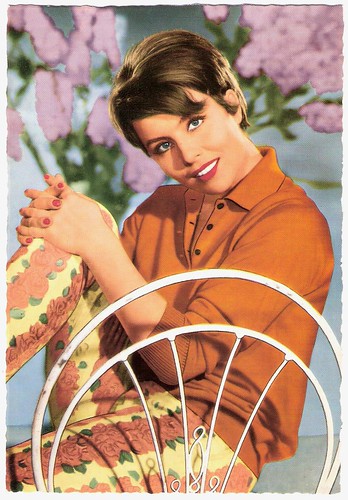
Sonja Ziemann. German postcard by WS-Druck, Wanne-Eickel, no. F 168. Photo: CCC / Arthur Grimm.
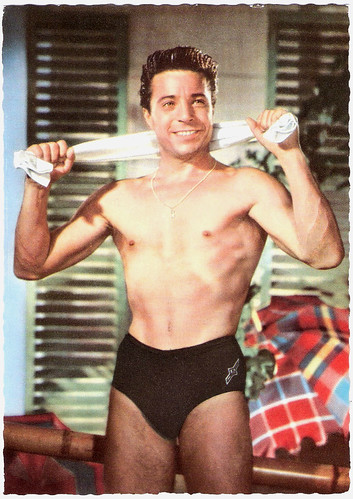
Peter Garden. German postcard by Ufa (Universum-Film Aktiengesellschaft), Berlin-Tempelhof, no. CK-87. Retail price: 30 Pfg. Photo: Arthur Grimm / Ufa.
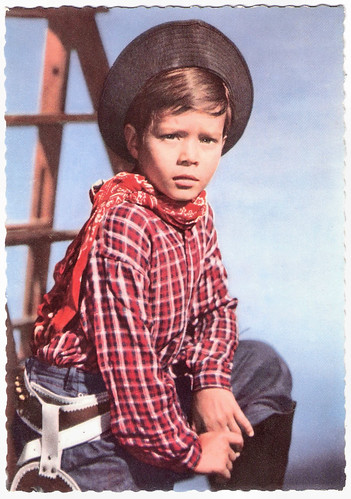
Oliver Grimm - a nephew of Arthur Grimm. German postcard by Ufa, Berlin-Tempelhof, no. CK-29. Photo: Arthur Grimm / Ufa.
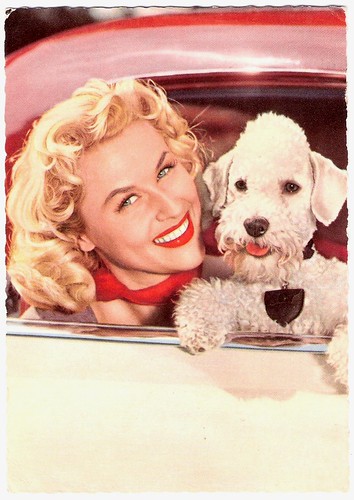
Bibi Johns. German postcard by Universum-Film Aktiengesellschaft (Ufa), Berlin-Tempelhof, no. CK-91. Sent by mail in Germany in 1962. Photo: Arthur Grimm.
Arthur Grimm was born in Rehau, Germany, in 1908. His older brother was the director Hans Grimm, and his sister Betti was married since 1938 with the director and producer Kurt Hoffmann.
In 1933 Grimm was a member of the NSDAP group in Rehau. The following year, he moved to Berlin. Before the Second World War, Grimm made press photos of numerous political events of the Nazis.
In 1936, he was responsible for the stills and some of the set photographs during the filming of Leni Riefenstahl's Olympia (1936). He accompanied Riefenstahl and her team to Greece.
In the same year he recorded the Spanish Civil War as a photojournalist for a French news agency. In March 1939, he photographed the mob from the roadside when the Germans marched into Prague.
In the fall of 1939, Grimm worked in the Warsaw Ghetto. His anti-Semitic ‘photojournalism’ appeared on 5 December 1939 in the Berliner Illustrierte Zeitung.
From May 1940 to 1945 he worked as a special agent in a propaganda company for the magazine Signal. There appeared his photo stories about the war in France, the Balkan and especially in the Soviet Union.
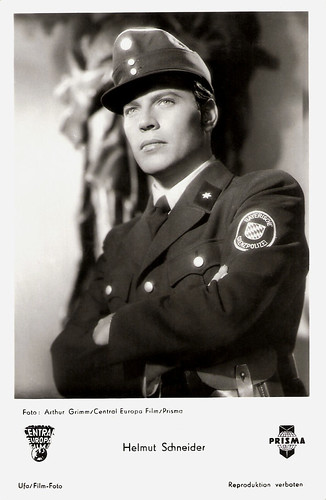
Helmuth Schneider. German postcard by Ufa, Berlin-Tempelhof, no. FK 1268. Photo: Arthur Grimm / Central Europa Film / Prisma. Publicity still for Die Schützenliesel/Schützenliesel (Rudolf Schündler, 1954).
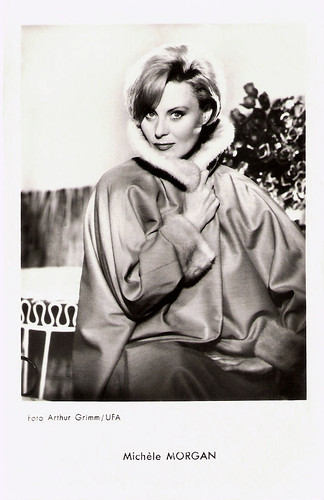
Michèle Morgan. French postcard by Editions P.I., Paris (Licency holder in France for Ufa), no. FK 17A. Offered by Les carbones Korès 'Carboplane'. Photo: Arthur Grimm / Ufa.

Maria Frau. German postcard by Ufa, Berlin-Tempelhof, no. FK 455. Photo: Arthur Grimm / CCC-Film / Allianz. Publicity still for Stern von Rio (Kurt Neumann, 1955).
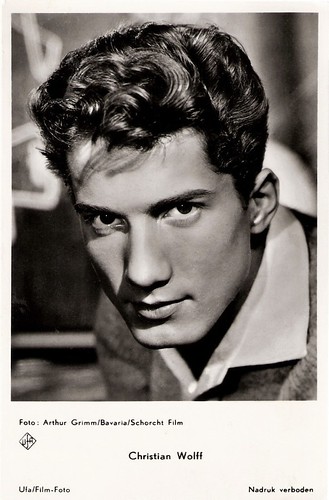
Christian Wolff. Dutch postcard by Gebr. Spanjersberg N.V., Rotterdam, no. 3846. Photo: Arthur Grimm / Bavaria /Schorcht Film. Gebr. Spanjersberg was the licence holder for the Netherlands of the postcards by Ufa (Universum-Film Aktiengesellschaft), Berlin-Tempelhoff.
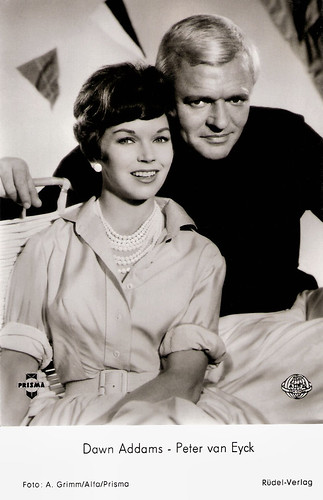
Dawn Addams and Peter van Eyck. German postcard by Rüdel-Verlag, Hamburg-Bergedorf, no. 2852. Photo: Arthur Grimm / Alfa / Prisma. Publicity still for Geheimaktion Schwarze Kapelle/The Black Chapel (Ralph Habib, 1959).
Around 1945 Arthur Grimm moved his studio to Wernigerode in the Harz Mountains. In the immediate post-war years, he trained young photographers including the later known photographer Horst Lang.
At some point he returned to West Berlin and from 1951 until 1984 he worked successfully as still photographer for film and television.
Films for which made film stills were Sündige Grenze/Illegal Border (Robert A. Stemmle, 1951) with Inge Egger, the crime thriller Die Spur führt nach Berlin/Adventure in Berlin (František Čáp, 1952) and the adventure film Stern von Rio/Star of Rio (Kurt Neumann, 1954) with Maria Frau.
In 1955, the former Nazi propaganda photograph even made the stills for the war film Der 20. Juli/The Plot to Assassinate Hitler (Falck Harnack, 1955).
For the drama Die Ratten/The Rats (Robert Siodmak, 1955) with Maria Schell and Curd Jürgens, Grimm was credited as the ‘star photographer’. Later he also made the stills for Fritz Lang’s Die 1000 Augen des Dr. Mabuse/Diabolical Dr. Mabuse (1960).
When the German television took over the cinema, the ZDF station became one of his regular clients. One of his last feature films was Herrliche Zeiten im Spessart/Glorious Times in the Spessart (Kurt Hoffmann, 1967) with Liselotte Pulver.
His studio was located in the Englerallee in Berlin-Dahlem. The last years of his life he lived in Hamburg. In 1971 he handed over parts of his archive to the Bildarchiv Preußischer Kulturbesitz (Prussian Heritage Image Archive) in Berlin. Additional material from his collection was in 1983 bought by the kPa-Fotoarchiv which passed again in 1998 in the possession of the Agency Content Mine International AG in Cologne.
Where and when exactly Arthur Grimm died is unclear.

Johanna von Koczian. German postcard by Ufa, Berlin-Tempelhof, no. CK-64. Photo: Arthur Grimm / Central Europa Film.
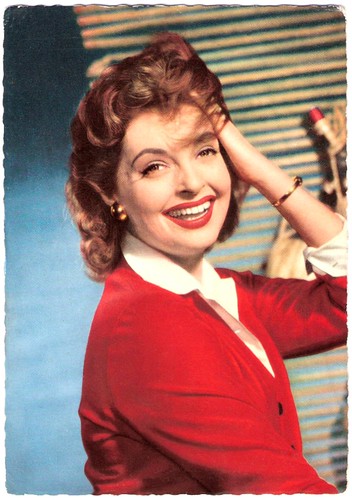
Nadja Tiller. German postcard by Ufa (Universum-Film Aktiengesellschaft), Berlin-Tempelhof, no. CK-123. Photo: Arthur Grimm / Ufa.
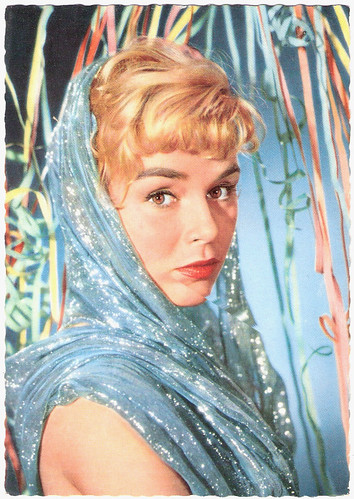
Susanne Cramer. German postcard by Ufa (Universum-Film Aktiengesellschaft) Berlin-Tempelhof, no. CK-114. Retail price: 30 Pfg. Photo: Arthur Grimm.
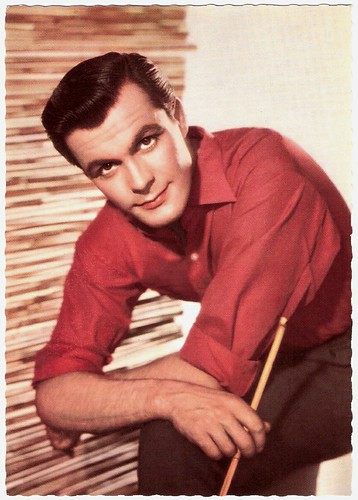
Toni Sailer. German postcard by Ufa, Berlin-Tempelhof, no. CK-314. Photo: Arthur Grimm / Ufa.
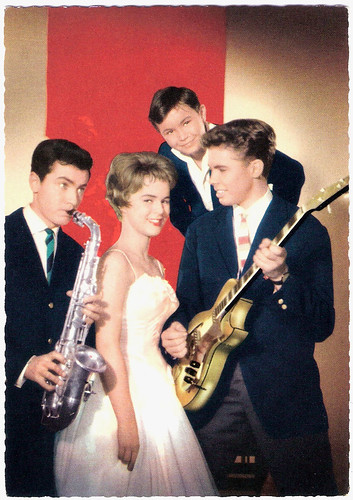
Conny Froboess, Rex Gildo, Peter Kraus and Rolf Pinegger. German postcard by ISV, no. E 13. Photo: Constantin / Grimm.
Check out our other posts on film star photographers. See the links at right under the caption 'The Photographers'.
Sources: Filmportal.de, Wikipedia (German) and IMDb.

Maria Schell. German postcard by Ufa (Universum-Film Aktiengesellschaft), Berlin-Tempelhof, no. CK 420. Retail price: 30 Pfg. Photo: Arthur Grimm / Ufa.

Sonja Ziemann. German postcard by WS-Druck, Wanne-Eickel, no. F 168. Photo: CCC / Arthur Grimm.

Peter Garden. German postcard by Ufa (Universum-Film Aktiengesellschaft), Berlin-Tempelhof, no. CK-87. Retail price: 30 Pfg. Photo: Arthur Grimm / Ufa.

Oliver Grimm - a nephew of Arthur Grimm. German postcard by Ufa, Berlin-Tempelhof, no. CK-29. Photo: Arthur Grimm / Ufa.

Bibi Johns. German postcard by Universum-Film Aktiengesellschaft (Ufa), Berlin-Tempelhof, no. CK-91. Sent by mail in Germany in 1962. Photo: Arthur Grimm.
Anti-Semitic ‘photojournalism’
Arthur Grimm was born in Rehau, Germany, in 1908. His older brother was the director Hans Grimm, and his sister Betti was married since 1938 with the director and producer Kurt Hoffmann.
In 1933 Grimm was a member of the NSDAP group in Rehau. The following year, he moved to Berlin. Before the Second World War, Grimm made press photos of numerous political events of the Nazis.
In 1936, he was responsible for the stills and some of the set photographs during the filming of Leni Riefenstahl's Olympia (1936). He accompanied Riefenstahl and her team to Greece.
In the same year he recorded the Spanish Civil War as a photojournalist for a French news agency. In March 1939, he photographed the mob from the roadside when the Germans marched into Prague.
In the fall of 1939, Grimm worked in the Warsaw Ghetto. His anti-Semitic ‘photojournalism’ appeared on 5 December 1939 in the Berliner Illustrierte Zeitung.
From May 1940 to 1945 he worked as a special agent in a propaganda company for the magazine Signal. There appeared his photo stories about the war in France, the Balkan and especially in the Soviet Union.

Helmuth Schneider. German postcard by Ufa, Berlin-Tempelhof, no. FK 1268. Photo: Arthur Grimm / Central Europa Film / Prisma. Publicity still for Die Schützenliesel/Schützenliesel (Rudolf Schündler, 1954).

Michèle Morgan. French postcard by Editions P.I., Paris (Licency holder in France for Ufa), no. FK 17A. Offered by Les carbones Korès 'Carboplane'. Photo: Arthur Grimm / Ufa.

Maria Frau. German postcard by Ufa, Berlin-Tempelhof, no. FK 455. Photo: Arthur Grimm / CCC-Film / Allianz. Publicity still for Stern von Rio (Kurt Neumann, 1955).

Christian Wolff. Dutch postcard by Gebr. Spanjersberg N.V., Rotterdam, no. 3846. Photo: Arthur Grimm / Bavaria /Schorcht Film. Gebr. Spanjersberg was the licence holder for the Netherlands of the postcards by Ufa (Universum-Film Aktiengesellschaft), Berlin-Tempelhoff.

Dawn Addams and Peter van Eyck. German postcard by Rüdel-Verlag, Hamburg-Bergedorf, no. 2852. Photo: Arthur Grimm / Alfa / Prisma. Publicity still for Geheimaktion Schwarze Kapelle/The Black Chapel (Ralph Habib, 1959).
Fritz Lang
Around 1945 Arthur Grimm moved his studio to Wernigerode in the Harz Mountains. In the immediate post-war years, he trained young photographers including the later known photographer Horst Lang.
At some point he returned to West Berlin and from 1951 until 1984 he worked successfully as still photographer for film and television.
Films for which made film stills were Sündige Grenze/Illegal Border (Robert A. Stemmle, 1951) with Inge Egger, the crime thriller Die Spur führt nach Berlin/Adventure in Berlin (František Čáp, 1952) and the adventure film Stern von Rio/Star of Rio (Kurt Neumann, 1954) with Maria Frau.
In 1955, the former Nazi propaganda photograph even made the stills for the war film Der 20. Juli/The Plot to Assassinate Hitler (Falck Harnack, 1955).
For the drama Die Ratten/The Rats (Robert Siodmak, 1955) with Maria Schell and Curd Jürgens, Grimm was credited as the ‘star photographer’. Later he also made the stills for Fritz Lang’s Die 1000 Augen des Dr. Mabuse/Diabolical Dr. Mabuse (1960).
When the German television took over the cinema, the ZDF station became one of his regular clients. One of his last feature films was Herrliche Zeiten im Spessart/Glorious Times in the Spessart (Kurt Hoffmann, 1967) with Liselotte Pulver.
His studio was located in the Englerallee in Berlin-Dahlem. The last years of his life he lived in Hamburg. In 1971 he handed over parts of his archive to the Bildarchiv Preußischer Kulturbesitz (Prussian Heritage Image Archive) in Berlin. Additional material from his collection was in 1983 bought by the kPa-Fotoarchiv which passed again in 1998 in the possession of the Agency Content Mine International AG in Cologne.
Where and when exactly Arthur Grimm died is unclear.

Johanna von Koczian. German postcard by Ufa, Berlin-Tempelhof, no. CK-64. Photo: Arthur Grimm / Central Europa Film.

Nadja Tiller. German postcard by Ufa (Universum-Film Aktiengesellschaft), Berlin-Tempelhof, no. CK-123. Photo: Arthur Grimm / Ufa.

Susanne Cramer. German postcard by Ufa (Universum-Film Aktiengesellschaft) Berlin-Tempelhof, no. CK-114. Retail price: 30 Pfg. Photo: Arthur Grimm.

Toni Sailer. German postcard by Ufa, Berlin-Tempelhof, no. CK-314. Photo: Arthur Grimm / Ufa.

Conny Froboess, Rex Gildo, Peter Kraus and Rolf Pinegger. German postcard by ISV, no. E 13. Photo: Constantin / Grimm.
Check out our other posts on film star photographers. See the links at right under the caption 'The Photographers'.
Sources: Filmportal.de, Wikipedia (German) and IMDb.
No comments:
Post a Comment